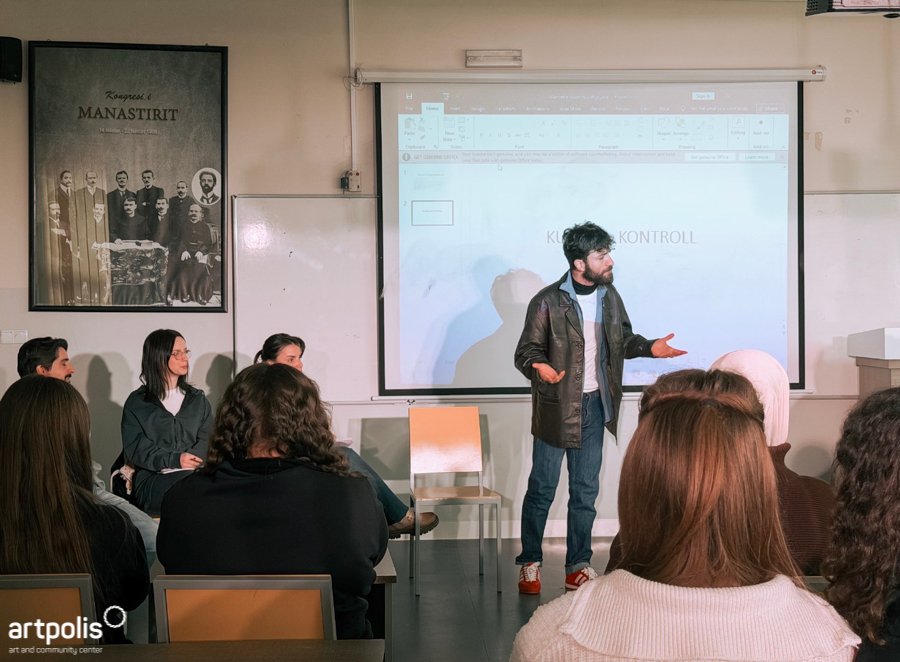
“Behind the Screen” in Vushtrri Highlights the Phenomenon of Online…
February 12, 2026

27.12.2023
On December 27, 2023, the premiere of the dance theater performance “Tre 1 T’eti” took place at Dodona Theater, created by Robert Nuha and the Artpolis Ensemble.
Through a combination of satire, contemporary dance, and drama, “Tre 1 T’eti” highlighted the toxic masculinity imposed on men over centuries by the patriarchal system and the systematic oppression of women.
“Tre 1 T’eti” raises questions without attempting to provide answers, leaving it to the audience to reflect. In a complex theatrical play, characters transform, travel through time, and delve into personal exploration in search of answers. Patriarchy and feminism clash throughout the narrative. Nuha skillfully embodies the two main characters, the father and the daughter, who are not physically staged but are the essence of the performance. They come to life through the narratives of three brothers played by Artpolis actors Edlir Gashi, Labinot Raci, and Mikel Markaj.
Toxic masculinity takes center stage in each scene, manifesting itself from the very beginning. The three brothers console each other over their father’s death, encouraging each other to “be a man,” “act like a man, not a woman,” “stand tall, don’t walk like a woman,” and “a man is a man!” This is followed by the clash of the twins, one slightly older than the other (two minutës), symbolizing hierarchy and toxic masculinity ingrained by patriarchy.
The conflict over their father’s property and inheritance divides the brothers, refusing equal distribution, especially for their sister. This clash leads them to their father’s grave, where they take his ring. Through the ring, the characters are transformed, time-travel, and trace the roots of patriarchal issues. Zeus, Hades, and Poseidon also appear on stage, ironically facing similar issues of inheritance division and the lust for power among the three brothers on Earth.
“Tre 1 T’eti” also criticizes rap, the music industry that daily conveys sexist messages and encourages the exploitation and violence against women. Each element of the performance is carefully selected and staged to reveal toxic masculinity and women’s right to property and life.
According to choreographer Robert Nuha, the creator of “Tre 1 T’eti,” toxic masculinity is much more prevalent than commonly discussed, starting within our families.
“Toxic masculinity is one of the crucial elements in the performance. The way I have dealt with it, together with the team, has brought us back to ourselves. We have returned to our families, we have returned to what we live and what we see and hear every day. So, toxicity begins in the family; male toxicity is much greater than we talk about, but we often go too far and forget that it is very close,” said Nuha after the premiere, emphasizing that people need to start reflecting on everything we have been taught so far, especially concerning the discrimination against women and family violence.
For the co-director of this performance, Butrint Pasha, patriarchy also harms men by demanding them to ‘be men.’
‘In the play Tre 1 T’eti, we witness real events of the subconscious of some men; that’s how I understood it during the process. In this sense, patriarchy is directly or indirectly harming men because feminism is undoubtedly damaging it. It’s not easy for someone to say ‘be a man,’ ‘act like a man,’ ‘you’re a boy.’ It’s a demand; we are required to be such. We are required to be strong, not to cry, to work more than needed, to do more than we deserve and are capable of,’ expressed Pasha.”
Theater director Fadil Hysaj has appreciated the work of the Artpolis Ensemble, emphasizing that this performance is a very good start to feminist themes. What makes it distinctive is precisely the treatment of the theme through the perspective of men.
“This is an entry into a process that I think Artpolis will have in the future, which sees that the problem of women is not in women, but in men. The emancipation of men must also begin for the advancement of women’s rights. Because any rebellion, any courage we think women should have, if we don’t work towards the awareness of men or their reflection on what is happening in our society, then it can only increase the conflict and make women victims again,” said Hysaj.
Due to the conceptual nature of the performance, the number of spectators was limited, and 50 people had the opportunity to attend the premiere of “Tre 1 T’eti” at Dodona Theater.
“Tre 1 T’eti” (T’thymtë) is a production by Artpolis, supported by the Ministry of Culture, Youth, and Sports, and the Swiss organization Frieda.